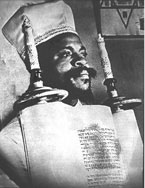This is an old revision of this page, as edited by Rjwilmsi (talk | contribs) at 03:56, 23 June 2008 (gen fixes + format *date= in cite news/web/paper templates - full explanation here using AWB). The present address (URL) is a permanent link to this revision, which may differ significantly from the current revision.
Revision as of 03:56, 23 June 2008 by Rjwilmsi (talk | contribs) (gen fixes + format *date= in cite news/web/paper templates - full explanation here using AWB)(diff) ← Previous revision | Latest revision (diff) | Newer revision → (diff)| Part of a series on |
| Judaism |
|---|
   |
| Movements |
| Philosophy |
| Texts |
| Law |
|
Holy cities/places
|
| Important figures |
| Religious roles |
|
Culture and education
|
| Ritual objects |
| Prayers |
| Major holidays |
| Other religions |
| Related topics |
The "Commandment Keepers: Holy Church of the Living God" are a sect of Black Jews, founded in 1919 by Nigerian-born Rabbi Wentworth Arthur Matthew, who believe that people of Ethiopian descent represent one of the lost tribes of Israel. They claim King Solomon and the Queen of Sheba as their ancestors, and believe the biblical patriarchs to have been black.

The mother congregation of the movement has since 1962 been located at 1 West 123rd Street in Harlem, New York City. Most of its members are black but it has always had white visitors and occasionally white members. They use the De Sola Pool Spanish and Portuguese prayerbook, the Hertz Chumash, parchment Torah scrolls, and offer standard orthodox Sephardi style Sabbath and Jewish Holyday services.
The congregation is featured in a scene from the 1970 motion picture The Angel Levine which starred Harry Belafonte and Zero Mostel.
In 1973, Matthew died, creating an interior conflict over who would be the new leader. David Matthew Doré, who was 16 years old at the time, was named spiritual leader of the congregation just before Matthew’s death. In 1975, the board of the congregation elected Willie White to be the new leader. Doré continued to host services at the synagogue until the early 1980s, when White began locking people out. Doré at this time was working as a lawyer, but states that he often tried to enter the synagogue. Throughout the 1990s membership was declining. In 2004, Zechariah ben Lewi became the rabbi for the Commandment Keepers, and membership has dropped to eight people. A lawsuit was filed against Doré that year for wrongfully claiming himself to be the spiritual leader of the congregation. The court ruled against Doré. The ruling was overturned on July 9, 2007. The board proceeded to sell the building at 1 West 123rd Street. Doré, as attorney for Commandment Keepers Ethiopian Hebrew Congregation of the Living God Pillar and Ground of Truth, Inc., filed a lawsuit against the board for selling the historic landmark, and in October 2007 a court vacated the sale and ordered a trial. As of 2008, Doré's suit against the buyer was pending.
The congregation will be profiled in a documentary film currently under development, which will be released in the near future.
References
- ^ The Manhattan African-American History and Culture Guide, Museum of the City of New York
- University of Virginia New Religious Movements website
- The Angel Levine, MGM.com
- Herschthal, Eric (2007-07-06). "Decline Of A Black Synagogue". The Jewish Week. Retrieved 2008-02-09.
{{cite news}}: Cite has empty unknown parameter:|coauthors=(help) - Commandment Keepers v. Doré, David Matthew. Supreme Court of the State of New York. Index #100769/2004.
- Commandments Keepers. Supreme Court of the State of New York. Index #117509/2006.
- Commandment Keepers v. 31 Mount Morris Park. Supreme Court, New York County. Index #106102/2007.
- "The Commandment Keepers" film website
- Article on Black Jewish community, jewishvirtuallibrary.org
- Synagogue profile at nyc-architecture.com
- Congregation description at film website
- New York Post article on congregation.